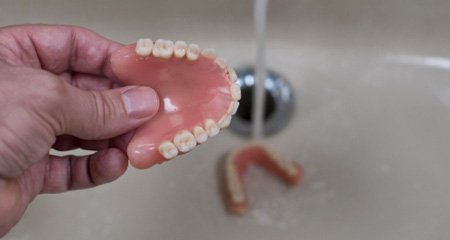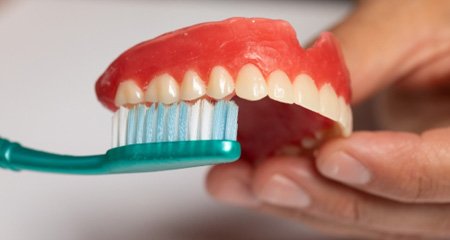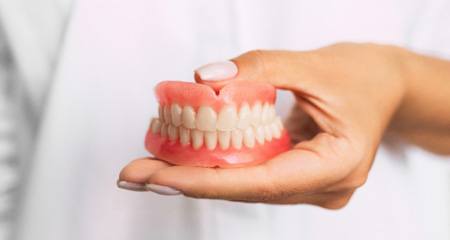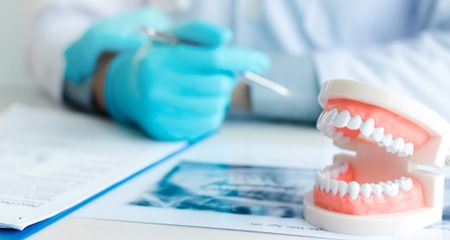Dentures– Gainesville, FL
Restoring Smiles with Reliable Tooth Replacements

Whether it is a few or all your teeth that are missing, it can be devastating to your self-esteem and oral health. While you’re busy hiding behind your hands each time you speak to someone or a camera appears, your mouth (and face) are undergoing a transformation that will have you seeing someone in the mirror you may not recognize. To prevent this, our doctors offer partials and dentures in Gainesville, FL. For years, patients have achieved success with this type of restorative dentistry, and so can you! In fact, with dentures, you can take back your smile and your facial appearance, feeling more confident than ever about the way you look.
Signs You Need Full or Partial Dentures

If you think dentures are only available to people over the age of 60, you’ll be surprised to learn that younger individuals are now seeking partial or full dentures as a chosen method of restorative treatment. Recent surveys indicate that by 2020, female denture wearers over 40 will increase from 33.6 million to 37.9 million.
For individuals who practice good oral hygiene habits throughout their life, the likeliness for dentures may be less, but dependent upon how well you keep up with your teeth and gum health, there are ways to tell if you will be talking to your dentist about dentures in the future, some of which include:
- Your teeth are loose or beginning to shift
- Your visits to the dentist are not every six months like they should be
- Toothaches are a normalcy
- Your gums are red, tender, swollen, and often bleeding
- You already have one or multiple missing teeth
- Certain foods are more difficult to consume
- Indigestion is a common occurrence
Benefits of Full and Partial Dentures

If you’re struggling to decide whether full or partial dentures are right for you, we encourage you to consider the many benefits this type of restorative dentistry offers to patients with missing teeth, such as:
- Improved appearance – Facial sagging or collapse will no longer be a concern because of the fixtures in your mouth that will fill out your cheeks and restore your smile.
- Ability to Chew and Speak – Without teeth, you will notice your ability to perform certain “normal” tasks are difficult. However, with dentures, you will be able to eat and chew with confidence as well as speak with clarity.
- Affordability – There are other restorative methods out there that offer permanence and greater stability, but they also cost considerably more. With dentures and partials, you can achieve desired results at a much lower cost.
What You Should Know Before Getting Dentures

Before you move forward with full or partial dentures, it is in your best interest to have all the information you need. We certainly don’t want you to make a decision about your dental care without being 100% confident about it. To help in your decision-making process, here are a few things you should know about this tried and true treatment:
- Dentures look completely natural – There is no need to worry about the appearance of your “false teeth.” With the advancements in dentistry, your new smile will look completely natural. From the materials used to the techniques and technology, your artificial teeth and gums will appear as if they have been a part of your mouth all along.
- They are comfortable to wear – In George Washington’s day, dentures were made of wood, and they were certainly not made to be comfortable. Fortunately, times have changed, and dentures are now lighter and can more closely conform to your jaw and gums, making it a much more pleasing experience.
- They’re not made to last forever – As great as they are, dentures are unfortunately not designed to last a lifetime. Over time, changes in your jaw and facial structure will lead to relining, readjusting, and replacing your dentures.
Understanding the Cost of Dentures

Dentures are personalized to fit your mouth exactly and provide many years of use and function. Of course, since they are so customized to your needs, there are multiple factors that come into play when determining their cost. By giving us a call and scheduling an appointment, you can speak with our dedicated team directly. In the meantime, consider the most notable contributing factors below ahead of your visit.
How to Get Started
If you are searching for a “dentist near me,” to help restore your smile to its original beauty, look no further than Drs Art & Kim Mowery. Their expert knowledge and experience will have you not only seeing beautiful results but an increase in your confidence level. No one should have to go through life with missing teeth, so if you’re ready, get started today by calling us to schedule a consultation. We will be happy to assist you!
Denture Aftercare

When you first get dentures, continued dental care might seem unnecessary. “After all,” you may think, “artificial teeth won’t decay like natural ones.” Still, the truth is that dentures need daily upkeep. They rely on regular maintenance and a healthy mouth to work. Therefore, maintaining good oral habits in the future is crucial. To that end, Exceptional Dentistry has some tips on caring for dentures. Just keep reading to learn about them, or call our office for the details.
Removeable Dentures
Remove After Eating

As a precaution, remove and rinse your dentures after each meal. That way, you’ll keep leftover food, plaque, and other debris from building up on their surfaces. Consequently, you’ll be less likely to develop oral health issues.
At the same time, don’t use hot water for these rinses. High temperatures, you see, can actually warp denture material. As such, rinsing with overly-hot water may result in your dentures not fitting well.
Clean Your Restoration

In addition to rinsing them, you should also clean your dentures at least once daily. That way, you’ll reduce your risk of gum disease and similar oral health issues.
As with a rinse, remove your dentures for each cleaning. You can then brush them with a soft-bristled toothbrush and some hand soap. You’ll want to avoid using regular toothpaste, which is abrasive and can damage dentures.
If you have time, put the dentures in a cleansing solution after brushing. This action keeps them from drying out and losing their shape. Then, rinse the dentures thoroughly before re-inserting the prosthetic teeth.
Keep Your Dentures Safe

If you don’t already know, dentures are surprisingly fragile. They thus need to be consistently protected. Otherwise, the restorations could be damaged once outside your mouth.
From now on, then, keep a towel handy during denture cleanings. Placing one beneath the prosthetics will cushion your appliance if it falls.
Similarly, consider storing your dentures away from kids or pets. Such groups, after all, could find them and cause damage.
Remove Dentures When You Sleep

Ideally, you ought to take your dentures out before bed. Failing to do so will cause problems down the road.
Ultimately, there are several reasons not to sleep with dentures:
- Doing so restricts the circulation in your gums, leading to soft-tissue irritation.
- Wearing dentures overnight increases levels of gum and tongue plaque.
- The habit raises your risk of catching pneumonia.
Instead of using them while sleeping, keep your dentures in a soaking solution overnight. This habit will prevent the restorations from losing their shape.
Notice Changes

Now and in the future, you should watch for changes in your dentures and mouth. Such things may need to be addressed by a local dentist.
For example, visit the nearest practice if the dentures start fitting poorly or suffer damage. Trying to fix them yourself will simply do more harm. In contrast, a dental provider can refit, reline, or even replace the prosthetics.
Denture Frequently Asked Questions

We want you to feel absolutely confident about every treatment you choose for your smile. If you’re considering dentures, we invite you to peruse the most commonly asked questions we get about them listed below. If you don’t see the answers your looking for, don’t hesitate to give us a call and we’ll be happy to help.
How Long Will My Dentures Last?
It’s natural for your mouth to change over time. However, since partial and full dentures rely on your gums and natural teeth for support, these changes can cause them to lose their fit. In most cases, you’ll need to replace your dentures after five to seven years of use. The lifespan of your dentures also heavily depends on how well you take care of them! Cleaning them with the wrong products can weaken them and handling them carelessly can easily damage them. However, as long as you care for them properly, you can expect your dentures to last for several long years to come.
Do I Brush Dentures Like Natural Teeth?
Just like your natural teeth, plaque and bacteria will build up on your dentures all throughout the day. While your dentures themselves aren’t susceptible to cavities, it’s important to clean away those particles to keep the rest of your mouth healthy. Brush your dentures and your mouth every morning and night, as well as after each meal if possible. You should only use special denture brushes and rinse them off with plain water—regular toothbrushes and toothpaste are too abrasive and can scratch away at your dentures.
How Long Does It Take to Get Used to Wearing Dentures?
While dentures can restore the appearance of your smile right away, they take a little bit of time to get used to. It’s important to remember to be patient with yourself as your mouth adjusts to your new dental devices. For the first few weeks of wearing your new dentures, you’ll need to practice how to remove, replace, and eat with them. It’s natural to feel a bit of soreness during the adjustment period as your gums and jaw get used to your dentures. However, if your pain doesn’t seem to be going away, contact us right away. We’ll check to see if you’re developing an infection or if your dentures need to be adjusted.
What Should I Do If My Dentures Break?
Even after you get used to your new dentures, it’s important that you continue to handle them with care. If you remove, replace, or clean them without paying enough attention, it’s all too easy to drop them on a hard countertop or tiled floor. If your dentures break, don’t try to repair them yourself—you may accidentally end up damaging them more. Instead, call us. We’ll carefully inspect your dentures at your appointment to determine the severity of the damage. Sometimes, we may be able to repair them, while other times they may need to be replaced entirely. To minimize your risk of breaking your dentures, it’s a good idea to lay a towel over nearby hard surfaces like your bathroom counter or sink when handling them.





